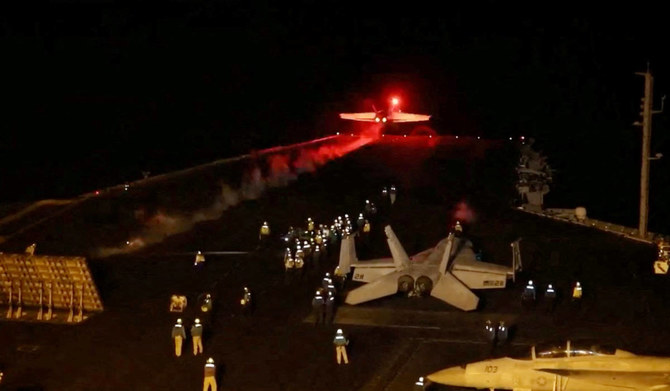WASHINGTON/DAVOS: The US military carried out new strikes in Yemen on Tuesday against anti-ship ballistic missiles in a Houthi-controlled part of the country as a missile struck a Greek-owned vessel in the Red Sea.
Disruptions to Red Sea shipping caused by Houthi attacks will push up prices of consumer goods in Europe in particular, an executive from port and freight operator DP World said as the impact on commerce increased.
The Iran-allied Houthi militia has threatened to expand its attacks to include US ships in response to American and British strikes on its sites in Yemen.
Attacks by the Houthis on ships in the region since November have affected companies and alarmed major powers — an escalation of Israel’s more than three-month-old war with Palestinian Hamas militants in Gaza. The Houthis say they are acting in solidarity with Palestinians.
The White House said additional US strikes on Tuesday took out ballistic missiles Houthis were ready to launch, confirming a Reuters story earlier, citing US officials, that a new strike was launched at four anti-ship missiles. The strike had not been previously reported.
“We’re not looking to expand this. The Houthis have a choice to make and they still have time to make the right choice, which is to stop these reckless attacks,” White House spokesperson John Kirby said.
France chose not take part in the US-led strikes because it wants to avoid a regional escalation, President Emmanuel Macron told a news conference. The country has a “defensive” approach in the Red Sea and would stick to this stance, Macron said.
Two heads of international banking groups attending the World Economic Forum (WEF) in Davos said privately that they were worried the crisis might cause inflationary pressures that could ultimately delay or reverse interest rate cuts and jeopardize hopes for a US economic soft landing.
DP World CFO Yuvraj Narayan said he expected disruptions to hit European imports.
“The cost of goods into Europe from Asia will be significantly higher,” Narayan told Reuters at the annual WEF meeting in Davos, the Swiss ski resort.
“European consumers will feel the pain ... It will hit developed economies more than it will hit developing economies,” the Dubai-based logistics company’s finance chief added.
War risk insurance premiums for shipments through the Red Sea are rising, insurance sources said on Tuesday.
In Spain, four factories owned by French tire maker Michelin are planning to halt output again this weekend, a further sign of the impact of delays in the delivery of raw materials.
SHIP HIT
A Malta-flagged, Greek-owned bulk carrier was struck by a missile while northbound in the Red Sea 76 nautical miles northwest of the Yemeni port of Saleef, a security firm and two Greek shipping ministry sources said.
Yemen’s Houthis carried out the attack on the ship, the Zografia, using naval missiles, resulting in a “direct hit,” the group’s military spokesperson Yahya Sarea said.
The Zografia was sailing from Vietnam to Israel with 24 crew on board and was empty of cargo when attacked, one of the Greek sources said. “There were no injuries, only material damage,” the source added. It was still sailing but would probably reroute for safety checks.
Underlining concerns, Japanese shipping operator Nippon Yusen, also known as NYK Line, instructed its vessels navigating near the Red Sea to wait in safe waters and is considering route changes, a company spokesperson said.
Shipping giant Maersk, however, sent two container ships through the Red Sea carrying goods for the US military and government.
GAZA CEASEFIRE CALL
Container vessels have been pausing or diverting from the Red Sea that leads to the Suez Canal, the fastest freight route from Asia to Europe. Many ships have been forced to circumnavigate South Africa’s Cape of Good Hope instead.
About 12 percent of world shipping traffic accesses the Suez Canal via the Red Sea.
Egypt’s Suez Canal authority played down any disruption, saying in a statement that the suspension of transit through the canal by companies was “temporary” and that traffic through the canal was “going as per normal.”
British oil major Shell has suspended all shipments through the Red Sea indefinitely after the US and UK strikes triggered fears of further escalation, the Wall Street Journal reported on Tuesday. Shell declined to comment.
US oil major Chevron said it is maintaining its shipping routes through the Red Sea. Exxon Mobil, which does not own or operate shipping vessels, said it “continues to support ship owners and operators in following guidance from the Combined Maritime Forces” — a reference to a multi-national naval partnership aimed at keeping the seas safe.
Russian tanker group Sovcomflot is also considering alternative routes in case the crisis escalates, TASS news agency reported. Sovcomflot did not immediately respond to a Reuters request for comment.
European diplomats said member states of the European Union had given initial backing to creation of a naval mission by Feb. 19 at the latest to help protect ships.
The existing US-led coalition meant to safeguard commercial traffic in the Red Sea is weak because regional powerhouses Saudi Arabia, the United Arab Emirates and Egypt have not taken part, Yemen’s vice president said on Tuesday.
“This Bab Al-Mandab corridor is of interest to the whole world and to the region, so regional intervention is key,” Aidarous Al-Zubaidi told Reuters in an interview, referring to the narrow strait at the southern entrance to the Red Sea.
Zubaidi’s separatist Southern Transitional Council is part of an alliance that opposes the Iran-backed Houthis in Yemen.
UN Secretary-General Antonio Guterres spoke with Iran’s Foreign Minister Hossein Amirabdollahian on Monday, Guterres’ spokesperson Stephane Dujarric said on Tuesday.
“Regarding the situation in the Red Sea, the secretary-general reiterated his call to all the parties to avoid any further escalation,” Dujarric said.
Saudi Arabia’s foreign minister underlined the link between Houthi attacks on commercial ships to the war in Gaza. Prince Faisal bin Farhan Al Saud said the kingdom’s priority is finding a path to de-escalation through a ceasefire in Gaza.




























